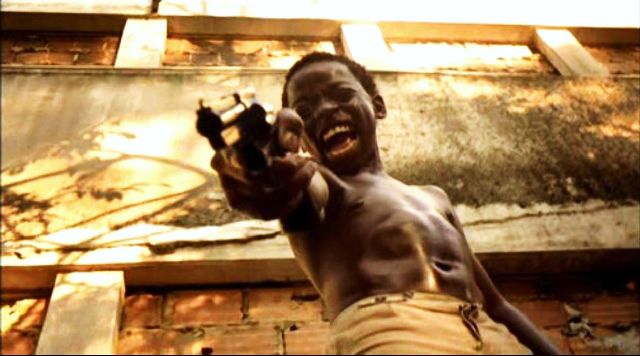City of God (2002) 
“If you run, the beast will get you. If you stay, the beast will eat you”

Director: Fernando Meirelles, Kátia Lund
Cast: Alexandre Rodrigues, Matheus Nachtergaele, Leandro Firmino
Synopsis: Two boys growing up in a violent neighborhood of Rio de Janeiro take different paths: one becomes a photographer, the other a drug dealer.
City of God explores an unfamiliar world and a way of life that’s unimaginable to most people. It’s a violent world in which life is the cheapest of commodities, and in which guns have an iconic status. Kids in the Brazilian slums ironically named the City of God grow up early, ‘killing, smoking and snorting’ before almost inevitably becoming just another victim of the city’s gun culture. Growing up in this gang-infested slum is Rocket (Alexandre Rodrigues), the younger brother of a rising hoodlum who is gunned down by a vicious youngster called L’il Dice (Douglas Silva). While most of the kids’ compulsion to kill is the result of a strong sense of self-preservation in an excessively violent society, L’il Dice gets a kick from taking lives, a fact we see when he coolly murders the patrons of a brothel which Rocket’s brother and his friends have just robbed.
The lives of Rocket and L’il Dice, who assumes the name of L’il Z as he grows older, intertwine even though they following diverging paths. While Rocket makes a conscious decision to avoid a life of crime and pursues a career in photography, L’il Z embraces the life of a hoodlum, ruthlessly murdering all of his rivals in a killing spree which paradoxically results in a brief period of peace in the barrios. But L’il Z’s rape of the girlfriend of a man who subsequently joins a rival gang eventually triggers a violent gang war…
You can see the influence of Martin Scorsese’s style of filmmaking in City of God, but Fernando Meirelles’ and Katia Lund’s direction possesses a vibrancy and immediacy that differ from Scorsese’s trademarks. Perhaps that’s simply because City of God explores an alien world that somehow seems more exotic despite its being mired in a milieu of poverty and exploitation, but while one can see the influences one never feels that the directors are trying to copy Scorsese, but rather to put into practice the techniques they have learned from studying his movies. It’s an important distinction — the difference between an homage to the style of another professional and the blatant ripping-off of their work.
The story is big and sprawling, taking in a large number of characters. At times it seems to lose its way, and a couple of female characters simply disappear without explanation. In fact, if City of God suffers from any major weakness it is that the female characters are under-written, although they are mostly peripheral characters.
While the story that City of God tells, although based on truth, is no different from the gangster movies Warners were churning out in the 1930s, it retains a freshness and enthusiasm for its plot that never lets up, and captures the heady sense of danger that comes with just trying to survive in the world it depicts.
httpv://www.youtube.com/watch?v=ioUE_5wpg_E
